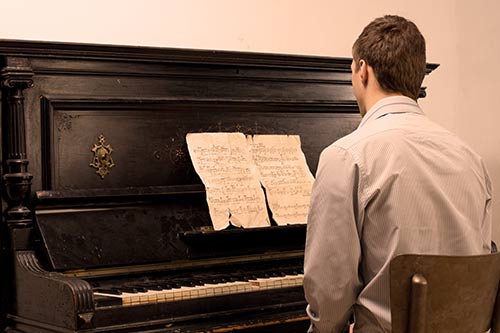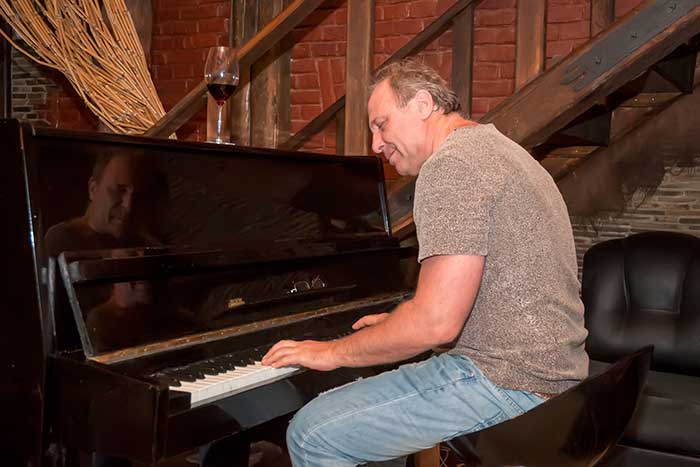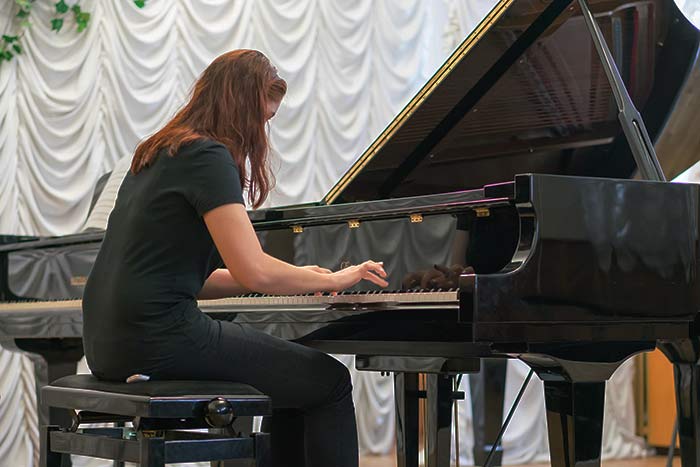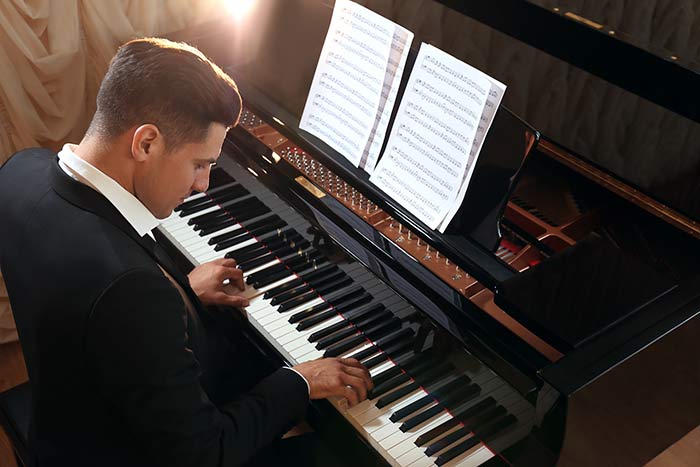REASON 1: Practising your scales will develop your musical technique and finger-ability on the piano

There is no arguing about the fact that the world’s greatest pianists practised scales on a daily basis in order to develop superb technique.
Paderewski, one of the most renowned pianists and once Prime Minister of Poland had an (approx.) twelve-hour daily workout of scales, arpeggios and various other exercises.
He also started piano at a late age.
Proving that YOU can learn and become great at any age!
Paderewski studied under master pianist Leschetizky, who made ABSOLUTELY sure Paderewski practised and practised and practised some more…
The lesson to learn here is that even if you are an absolute beginner, playing your scales on a daily basis with a strict regime of discipline will ensure your success in the future.
You will develop finger strength, flexibility, speed, agility, piano-fingered-know-how and musical ability.
It is absolutely vital to get to know all the major and minor scales across the piano keys.
Absolute beginners can start out by practising one octave, while improvers can practice two or three octaves.
More advanced students can practice both major, harmonic minor and melodic minor scales with both hands over for 4 to 6 octaves with a rhythmic variation.
It is absolutely essential to practice your technique on a daily basis if you hope to develop a great piano technique.
It is only in the daily doing that you will ever get anywhere!
You need a plan for your piano playing – and having a solid piano practise plan for scale practice is a must.
There are however some ‘schools of piano technique’ that do not believe in practising scales.
Even then certain technical exercises quite similar to scales would be substituted.
The point is scales are the easiest and the most proven method of developing your piano technique over time.
Let’s take a look at the world’s most celebrated virtuoso pianist Franz Liszt.
He was tutored by his father as well as the master Austrian composer and teacher Czerny.
Czerny received instruction from Beethoven for about three years…
Yes, he was a giant!
Czerny made Liszt abandon ALL repertoire and focus on pure technique for a period to lay a solid FOUNDATION OF TECHNIQUE!
You see there is a pattern here!
Czerny, who was no idiot knew that Liszt had to focus 100% on technique to lay an unshakeable foundation.
The entire piano world is now inspired thanks to Czerny’s dedication to Liszt… as well as Liszt – THE LIONHEART’S UNSTOPPABLE practise regime!
Take great inspiration from them!
A very famous Liszt quote after being inspired by the violin virtuoso Paganini:
For a whole fortnight my mind and my fingers have been working like two lost souls. Homer, the Bible, Plato, Locke, Byron, Hugo, Lamartine, Chateaubriand, 10 Beethoven, Bach, Hummel, Mozart, Weber are all around me. I study them, meditate on them, devour them with fury; besides this, I practise four to five hours of exercises (thirds, sixths, octaves, tremolos, repetition of notes, cadenzas, etc.) Ah! Provided I don’t go mad you will find in me an artist! Yes, an artist—such as is required today.
REASON 2: Music is composed “within a specific key or tone center”. If you play a Sonata in A Major, the music will largely consist of notes from the A Major scale

Because music is composed in the structure of a certain key, it is vital that you understand the 12 keys of music intimately.
As you progress in your musical journey, you want to instantly be able to move from one key to another WITHOUT hesitation.
Let’s say a certain passage of music is composed in the key of D major, you then want a perfect cognitive understanding of the key of D major and you need to know that D major has an F# and C#.
If another piece was written in say, for example, the key of Ab major then you want an immediate cognitive understanding of the fact that the key of Ab major has four flats namely Ab, Bb, Db and Eb.
At the same time, you also want to be able to think of the relative minor – F Minor and the implications of that.
In a split second.
Yes – knowing your keys is vital.
That is why you need to practice your scales rigorously throughout all 12 keys of the piano REGULARLY, preferably daily!
Once you get a deeper understanding of all the keys, music will get easier to play and enjoy!
Think about the keys…
Have them for breakfast, lunch and dinner!
REASON 3: Practising your scales will develop your musical ear.

I love listening to Mozart.
In fact, I am fascinated by the music of Mozart.
Was Mozart a genius?
I personally do not think so.
At least not in the traditional sense.
You see, as crazy as it may sound to you, I think we are all geniuses.
Yes, some of us possess more talent than others at times, but we all have infinite ability.
The only difference between Mozart and you may be the fact that Mozart spent a lot of time with both the melodic and harmonic aspect of music as well as tonality in order to be able to create melodies that came effortlessly.
How did he get this right?
He became music.
He became the instrument and allowed music to flow through him…
He became the movement of notes moving up and down and moving together.
(Remember there are only a limited number of possibilities – especially for most of the major harmonic and melodic movements. Yes, music is infinite, but patterns are generally categorised in limited numbers of like-for-like occurrences)
Mozart just knew his scales intimately!
In multi-dimensions…
He knew how melodies move up and down and how to manipulate certain tones at exactly the right moment to create the right emotion through arranging the notes!
His education also started almost AT birth!
Basically, Mozart was a master of musical scales, musical theory and musical harmony.
I would recommend following the footsteps of Mozart and get to know the scales inside out – it will DEFINITELY develop your ear and your sense of understanding of music and musical key.
Remember music can move in melody and harmony.
Scales can be practised in single notes, 2nds, 3rds, 4ths, 5ths, 6ths, 7ths, Octaves with a thousand variations…
Therefore, as you progress in your playing – get creative and try new ideas!
Practise… practise… practise and listen a LOT!
REASON 4: Practising scales will boost your confidence
If you’ve just started with piano, it is absolutely vital to boost your confidence.
I cannot emphasise this enough – boosting your confidence will make you a better student.
By getting to know all your scales, you will feel more confident with music on the whole.
Yes, knowing your scales may not be the answer to all the challenges you will encounter in music, but it is a good start!
It will help you move in the right direction!
Take my word for it – get to know your scales inside out and practice DILIGENTLY on a daily basis.
You will be glad you did!
The most important thing is just to get started.
The hardest part is getting started – so start today.
REASON 5: Practising scales will help you reach piano mastery and develop muscle memory
To become truly great at playing the piano requires a lot of practice.
I recommend going for every edge that you can get!
You see, by practising scales you are installing disciple in your playing and routine.
You are also exercising courage, persistence, excellence and faithfulness.
Faithfulness in itself always brings a reward.
By following the laws of ‘being faithful’ – you will eventually be promoted.
Remember: Faithful in the litte… faithful in much!
You see faithfulness always brings a promotion.
So if you are faithful in your piano practice and your piano scale practice, you will be promoted and it will help you in the road towards piano mastery.
Sometimes that road may seem very far off but it’s important not to give up.
In the words of Winston Churchill – NEVER NEVER NEVER give up!
In addition to moving towards the path of mastery, it will also help you develop your muscle memory.
Muscle memory is an essential tool that you will need when memorising music for a performance.
If you study jazz piano, muscle memory can also aid you when learning your II V I licks. (A tough task – requiring immense dedication, mentoring and passion!)
It is absolutely essential to work hard on your scale practice and develop your muscle memory so that you can become the pianist that you’ve always wanted to be!
REASON 6: You will develop your sense of timing and rhythm especially If you practise with a metronome

Practising the piano with a metronome is especially advised when practising your piano scales.
You can also see my article on how to practice with a metronome.
I often recommend setting the metronome at a very slow pace.
Let’s say 40 BPM. (Beats per minute)
Practice all your major and minor scales in crotches then at 40 BPM.
You may feel that the speed is unbearably slow, but the purpose of the exercise is to study with a metronome at a very slow pace to learn how to PLAY IN TIME!
I have found that beginners often rush the notes of the scale.
It is, therefore, vital to take time to always play on the exact beat of the metronome.
It is very easy to play ahead of the beat and it takes a lot of discipline and rigour to play right on the beat or be ‘right on the money’ as the expression goes.
Some days you can practice at a more regular tempo, but from time to time it is a very good methodology!
Especially if you are a beginner piano student.
There are numerous other time and rhythm exercises of extreme importance, as you progress in your piano playing.
You should really focus on mastering crotchets, quavers, triplets and semi-quavers WITHOUT rushing the tempo.
Step-by-step is key!
The thing to remember is that by practising your scales, in addition to all the other benefits, you will also benefit from developing your ability to play in perfect time.
A difficult task when you start out.
But doable with enough diligent practice!
It is vital to realise that none of this will come overnight – remember only the faithful gets rewarded.
If you want to be promoted in your piano playing be a faithful student…
Sow your seeds, work the land and eventually you will reap a harvest of stunning piano technique!
The great news is that scales will definitely help you to get there.
REASON 7: Practising scales will help you get to know the “map” of the piano

I love the City of London.
There are so many beautiful streets, passages and little alleyways.
Along with a very rich history going back over 2000 years!
Just as you may know where Fenchurch Street is or King Edward Street is, just like that the piano has a type of map or area that you should get to know.
By practising your scales, you really get to know the chords, notes and important pathways of the piano and each key.
It may be difficult to see this when you’re just starting out, but as you progress you will realise just how important practising scales really are.
It may seem like a big chore, but it will actually set you free!
So take comfort in the fact that you are getting to know the map of the piano and music!
REASON 8: Knowing your scales, means knowing your keys and this will help you with your sight-reading
The word “sight-reading” gives many people the jitters.
Actually, sight-reading is a really doable skill just like any other.
As long as you practise how to sight-read properly!
One of the absolute essential tools when it comes to sight-reading is knowing the keys.
If you do not know your keys and scales then you will struggle when you attempt sight-reading. (And you will shake with fear and turmoil…)
For example, if a composition has four sharps in the key signatures, you need to immediately think E Major or C# Minor depending upon the context of notes of the composition.
You should then proceed to read the piece of music in the structure of E Major or C# minor.
It is absolutely essential that you know your keys off by heart and it is absolutely vital in the long run that you become an expert in all 12 keys!
Yes, it is a lot of work, but that is why we always recommend getting excellent quality tuition.
At the London Piano Institute, we pride ourselves on the fact that we offer top-notch world-class piano instruction specifically dedicated to adults.
If you want to seriously improve your playing – do not hesitate to get in contact with me. You can contact me personally: enrol@londonpianoinstitute.co.uk
Thank you so much taking your time to read this article!
Whatever road you choose when coming to learn the piano, I want to leave you with this final thought.
“Anything worth doing is worth doing properly.”
If you’re thinking of learning the piano without professional help– it can be very difficult.
It is a very complex instrument that requires a lot of personal attention and detail.
We offer both group and one-to-one classes specifically dedicated to you as an adult.
We are a dedicated piano academy for adults to flourish!
We specialise using our own proprietary adult piano teaching methodologies.
We would love to see you develop your own piano playing and become the pianists that you deserve to be.
We are confident with our input and your hard work – together, as a team we can help you ACHIEVE YOUR GOALS!
Once again – feel free to contact us here.
If you enjoyed this page, please do like us on Facebook or follow us on Twitter – it will be appreciated a thousand times over!
Have a wonderful piano journey!










